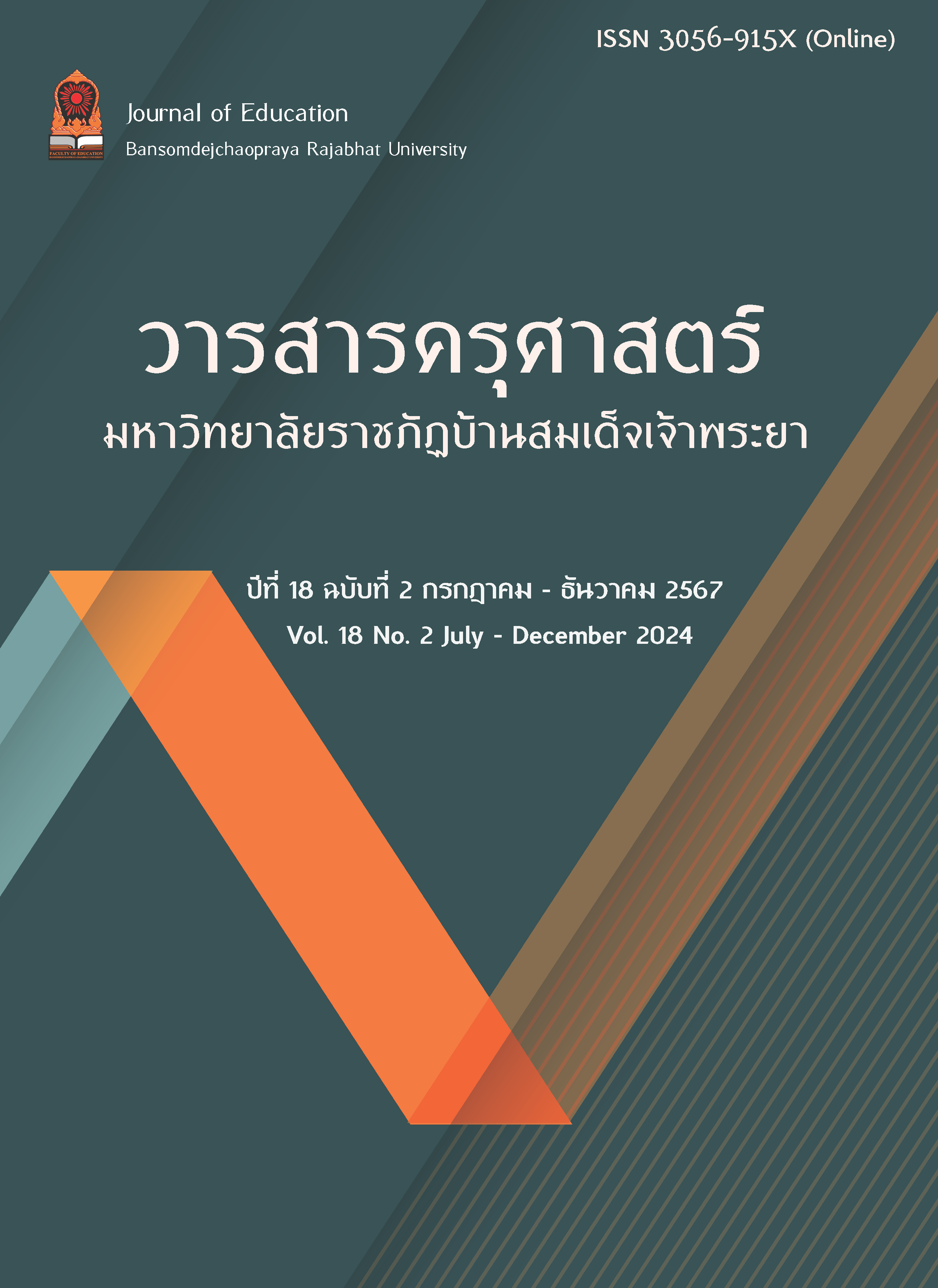Confirmatory Factor Analysis of the Learning science to Develop Digital Leadership Competencies for International Students Graduate Studies
Keywords:
Learning science, Digital Leadership Competency, International Students, Graduate StudiesAbstract
The Purpose of this Research was to Analyze the Confirm Factor Analysis of Learning Science to develop digital leadership competence of international graduate students. Data were collected by questionnaires from a sample group of 200 international graduate students of the Graduate School, Bansomdejchaopraya Rajabhat University, academic year 2024, using simple random sampling. Data were analyzed using advanced statistical programs. The questionnaire had a reliability value of .94. The results of the component analysis found that Learning science to develop digital leadership competence of international graduate students consisted of knowledge, leadership learning competence, learning resources, and digital technology systems. The model was consistent with the empirical data. Which is considered from the Chi-square value of 88.00; p=0.00025 at 61 degrees of freedom, the Goodness-of-Fitness Index (GFI) of 0.96, the Adjusted Goodness-of-Fitness Index (AGFI) of 0.94, the Comparative Fit Index (CFI) of 0.99, the Root Mean Square Error of Approximation (RMSEA) of 0.034, and the direction of driving the Learning science organization to develop digital leadership competencies of international graduate students, consisting of the main principles of knowledge, Learning science process, directions of knowledge utilization in the future world, knowledge utilization capabilities of leaders, knowledge integration, Learning science potential, learning resources, information media, knowledge processing units, knowledge system efficiency, digital technology, internet network systems, and signal system stability. It focuses on promoting and drawing out students' important competencies for leadership development in the digital world, which must be ready for changes that keep up with the world of science with digital Learning science and efficient information technology systems for developing excellent, outstanding, and unique organizations.
Downloads
References
จิรประภา อัครบวร. (2552). การจัดการความรู้. โครงการพัฒนานวัตกรรมการเรียนรู้.สำนักงานคณะกรรมการพัฒนาระบบราชการ.กรุงเทพมหานคร.
ปรารถนา สำราญสุข. (2565). DIGITAL LITERACY ทักษะของโลกยุคดิจิทัล. วิทยาจารย์, 121(1), 42-45.
ราชบัณฑิตยสถาน . (2554). พจนานุกรม ฉบับราชบัณฑิตยสถาน พ.ศ. 2554. แหล่งสืบค้น https://dictionary.orst.go.th/ สืบค้นวันที่ 2 กันยายน 2567.
วิทยาการเรียนรู้และศึกษาศาสตร์ สาขาวิทยาการเรียนรู้ มหาวิทยาลัยธรรมศาสตร์. (2567). แหล่งสืบค้น https://www.u-review.in.th/th/edu/155. สืบค้นวันที่ 5 กันยายน 2567.
แสงสุรีย์ ทองขาว และคณะ. (2566). บทบาทครูไทยกับเทคโนโลยีดิจิทัลเพื่อการจัดการศึกษา. วารสารพุทธสังคมวิทยาปริทรรศน์, 8(2), 130-144.
Cronbach, L.J. (1951). Coefficient Alpha and the Internal Structure of Tests. Psychometrika, 16, 297 – 334.
Jindapradit, T. (2018). Guidelines for The Development of Work Systems and Processes to Become A Digital Organization (แนวทางการพัฒนาระบบงานและกระบวนการทำางานสู่การเป็นองค์กรดิจิทััล). [Online]. Retrieved January 6, 2020 from http://wise.co.th/wise/Presentations/Digital/Organization. 17 January, 2018.pdf.
Milenkova, V. et al. (2021). "Digital Citizenship and Digital Literacy in the Conditions of Social Crisis"
Nonaka, I. & Takeuchi, H. (1995). The knowledge-creating company. New York: Oxford University Press.
Office of the Public Sector Development Commission. (2020). Digital Development for National Economic and Social Development (แผนพัฒนาดิจิทััลเพื่่อเศรษฐกิจและสังคม). Bangkok:Office of The Public Sector Development Commission
Sakpuwadol, S. (2010). Digital Organization Administration (การบริหารองค์กรดิจิิตอล). [Online]. Retrieved January 7, 2020 from http://www.ict.up.ac.th/surinthips/MIS2553/%E0%B9%81%E0%B8%9A%E0%B8%9A%E0%B9%80%E0%B8%A3%E0%B8%B5%E0%B8%A2%E0%B8%99/Ch5_DigitalFirm_53.pp
Thanabodeethammajarue, D. (2018). Digital Organization Designing (การออกแบบองค์กรดิจิทััล). [Online]. Retrieved January 5, 2020 from https://www.ocsc.go.th/sites/default/files/attachment/page/sruphng_1_kaarkaebbngkhkrdicchithal.pdf
Downloads
Published
How to Cite
Issue
Section
License
Copyright (c) 2024 Faculty of Educaion Bansomdejchaopraya Rajabhat University

This work is licensed under a Creative Commons Attribution-NonCommercial-NoDerivatives 4.0 International License.
บทความที่ได้รับการตีพิมพ์เป็นลิขสิทธิ์ของคณะครุศาสตร์ มหาวิทยาลัยราชภัฏบ้านสมเด็จเจ้าพระยา
ข้อความที่ปรากฏในบทความแต่ละเรื่องในวารสารวิชาการเล่มนี้เป็นความคิดเห็นส่วนตัวของผู้เขียนแต่ละท่านไม่เกี่ยวข้องกับมหาวิทยาลัยราชภัฏบ้านสมเด็จเจ้าพระยา และคณาจารย์ท่านอื่นๆในมหาวิทยาลัยฯ แต่อย่างใด ความรับผิดชอบองค์ประกอบทั้งหมดของบทความแต่ละเรื่องเป็นของผู้เขียนแต่ละท่าน หากมีความผิดพลาดใดๆ ผู้เขียนแต่ละท่านจะรับผิดชอบบทความของตนเอง



